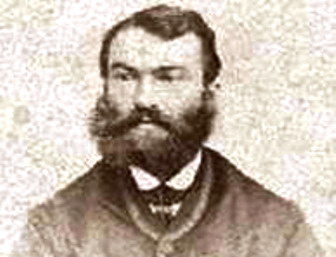Then there was Dr. James Parkinson, who was also an early socialist and author of many provocative pamphlets with titles like "Revolution without Bloodshed." In 1794, he was implicated in a faintly lunatic-sounding conspiracy called "the Pop-gun Plot," in which it was planned to shoot King George III in the neck with a poisoned dart as he sat in his box at the theater. Parkinson was hauled before the Privy Council for questioning and came within an ace of being dispatched in irons to Australia before the charges against him were quietly dropped. Adopting a more conservative approach to life, he developed an interest in geology and became one of the founding members of the Geological Society and the author of an important geological text, Organic Remains of a Former World, which remained in print for half a century. He never caused trouble again.
再就是詹姆斯·帕金森博士,他還是早期的社會主義者,寫過許多富有鼓動性的小冊子,比如《不流血的革命》。1794年,發生了一次聽上去有點兒發瘋的陰謀,叫做"玩具氣槍計劃",有人打算趁國王喬治三世在劇院包廂里看戲的機會用帶毒的飛鏢射中他的脖子。帕金森跟這件事有牽連,被帶到樞密院進行盤問,差一點給戴上鐐銬發配到澳大利亞。但是,對他的指控后來不了了之。他漸漸對生活采取比較保守的態度,并開始對地質學產生了興趣,最終成為地質學會的創始人之一和一部重要的地質學作品《上個世界的有機遺骸》的作者。有半個世紀時間,這本書不停地印刷。他再也沒有制造過麻煩。

Today, however, we remember him for his landmark study of the affliction then called the "shaking palsy," but known ever since as Parkinson's disease. (Parkinson had one other slight claim to fame. In 1785, he became possibly the only person in history to win a natural history museum in a raffle. The museum, in London's Leicester Square, had been founded by Sir Ashton Lever, who had driven himself bankrupt with his unrestrained collecting of natural wonders. Parkinson kept the museum until 1805, when he could no longer support it and the collection was broken up and sold.)
然而,今天我們所以記得他,是因為他對一種疾病的具有劃時代意義的研究。這種疾病在當時被稱之為"震顫性麻痹",但之后一直被叫做帕金森綜合征。(帕金森在另一個方面也稍有名氣。1785年,他很可能成了歷史上獨一無二的人,在一次兌獎銷售活動中贏得一個自然史博物館。這家博物館位于倫敦的萊斯特廣場,原本是阿什頓·利弗建立的,但利弗無節制地搜集自然寶物,最后搞得傾家蕩產。帕金森將這個博物館保留到1805年,再也維持不下去,便把收藏品拆賣了。)











